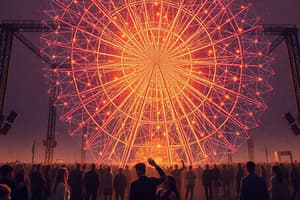Podcast
Questions and Answers
A sociologist is studying the impact of social media on political polarization. Which concept best describes how individuals' personal experiences with online echo chambers contribute to broader societal divisions?
A sociologist is studying the impact of social media on political polarization. Which concept best describes how individuals' personal experiences with online echo chambers contribute to broader societal divisions?
- Agency
- Significant symbol
- Sociological imagination (correct)
- Social structure
In the context of social interaction, which concept is best illustrated by a job applicant carefully choosing their attire and rehearsing answers to potential interview questions?
In the context of social interaction, which concept is best illustrated by a job applicant carefully choosing their attire and rehearsing answers to potential interview questions?
- Typification
- Definition of situation
- Social construction of reality
- Impression management (correct)
A researcher observes that in a certain society, individuals tend to accept existing social hierarchies as natural and inevitable. Which concept describes these unconscious, fundamental beliefs?
A researcher observes that in a certain society, individuals tend to accept existing social hierarchies as natural and inevitable. Which concept describes these unconscious, fundamental beliefs?
- Doxa (correct)
- Heterodoxy
- Sphere of opinion
- Orthodoxy
Which of the following scenarios best exemplifies the sociological concept of 'agency'?
Which of the following scenarios best exemplifies the sociological concept of 'agency'?
A handshake, as a form of greeting, can be considered a 'significant symbol' because:
A handshake, as a form of greeting, can be considered a 'significant symbol' because:
How do mores differ from folkways in the context of social norms?
How do mores differ from folkways in the context of social norms?
What research method would a sociologist employ if they aim to understand a community's cultural norms by living within the community and observing daily life?
What research method would a sociologist employ if they aim to understand a community's cultural norms by living within the community and observing daily life?
Which concept explains the interactive process through which knowledge is created and spread within a society?
Which concept explains the interactive process through which knowledge is created and spread within a society?
Which perspective emphasizes analyzing society by focusing on group power dynamics and resistance?
Which perspective emphasizes analyzing society by focusing on group power dynamics and resistance?
How did the Industrial Revolution influence the development of sociology as a discipline?
How did the Industrial Revolution influence the development of sociology as a discipline?
Flashcards
Significant Symbol
Significant Symbol
A gesture evoking the same response from sender and receiver.
Sociology
Sociology
Scientific study of individual-society interactions.
Society
Society
Complex web of relationships/institutions.
Agency
Agency
Signup and view all the flashcards
Social Structure
Social Structure
Signup and view all the flashcards
Sociological Imagination
Sociological Imagination
Signup and view all the flashcards
Epistemology
Epistemology
Signup and view all the flashcards
Empiricism
Empiricism
Signup and view all the flashcards
Typification
Typification
Signup and view all the flashcards
Culture
Culture
Signup and view all the flashcards
Study Notes
Week 1: Foundational Concepts
- A significant symbol is a gesture that evokes the same response in both the person making it and those receiving it.
- Handshake ritual is an example of a significant symbol.
- Sociology is a scientific discipline exploring individual-society interactions.
- Society is a complex network of relationships and institutions beyond individual components.
- Agency is the personal ability to make independent decisions.
- Social structure involves external forces shaping individual experiences
- Social structures include family, religion, legal systems, economic systems and social class
- Sociological Imagination is recognizing personal experiences as collective social phenomena.
- Job loss and student loan challenges are examples of sociological imagination.
Week 2: Sociological Foundations
- Two pivotal revolutions influenced sociology: The French Revolution and the Industrial Revolution.
- Epistemology is the understanding of knowledge production and social context.
- Empiricism: Knowledge is derived from sensory observation.
- Surveys and data collection are methodologies for gathering empirical knowledge.
- Functionalism views society as an interconnected system promoting stability.
- Conflict Theory focuses on group power dynamics and resistance.
- Symbolic Interactionism views society as created through human interactions.
- Quantitative research methods include experiments and surveys.
- Qualitative Research includes in-depth interviews and ethnography (participant observation).
Week 3: Social Interaction Dynamics
- Typification is creating standardized social assumptions.
- Social construction of reality is an interactive knowledge production.
- Definition of situation is a contextual sense-making process.
- Impression management involves influencing others' perceptions.
- Expression types include intentional and unintentional expressions.
- Performance regions include front stage for public performance and backstage for private performance refinement.
Week 4: Self and Cultural Development
- Self-concept components consist of:
- Imagined appearance to others.
- Others' judgments.
- Personal self-perception.
- Developmental stages include:
- Preparatory stage (0-2 years) which involves imitation.
- Play stage (2-6 years) which involves role-playing.
- Game stage (8-9 years) which entails to understanding complex relationships.
- Culture involves shared norms, values, and material goods.
- Material culture refers to physical objects influencing societal living.
- Non-material culture refers to shared meaning systems.
- Folkways are loosely enforced social expectations.
- Mores are critically important social rules.
- Laws are politically enforced regulations.
- Taboos are violations causing profound social revulsion.
Week 6: Belief Systems and Social Dynamics
- Doxa: Unconscious, fundamental societal beliefs.
- Sphere of Opinion: Openly contestable social discussions.
- Orthodoxy: Preserving original fundamental beliefs.
- Heterodoxy: Challenging and transforming existing beliefs.
Studying That Suits You
Use AI to generate personalized quizzes and flashcards to suit your learning preferences.




